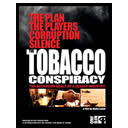Welcome Back, Big Tobacco
Is there such a thing as a safe cigarette? Every year, millions die from smoking-related illnesses. Meanwhile, Big Tobacco continues to peddle their products to nearly a billion smokers worldwide with little accountability. In this climate of devastating addiction and astronomical death tolls, an alternative to dangerous tobacco-laden cigarettes has taken hold. E-cigarettes promise all the pleasures of smoking without the lethal consequences, and they've become so popular that even the world's largest cigarette manufacturers are desperate to climb aboard and seize a piece of the action. Welcome Back, Big Tobacco, produced by the Canadian documentary series The Fifth Estate, investigates whether this new phenomenon is a true life saver or merely smoke and mirrors.
The filmmakers travel to the world's second largest tobacco company - British American Tobacco - and witness the work being done to produce the ideal vaping experience. Inside their top secret labs, over 800 million dollars is being spent on the development of e-cigarettes and other nicotine-based products which are designed to be less harmful than traditional cigarettes. But can a tobacco company really be relied upon to regulate itself, and encourage consumers to stop purchasing their most profitable cash cow?
Host Mark Kelly confronts a representative from the corporation's research and development department, and holds his feet to the fire on these crucial questions. He also speaks with members of the medical community who believe that such alternatives serve the public's best interest, regular citizens who have thrown away their cigarette packs in favor of a vaporizer, and Canadian health officials who remain on the fence regarding the ultimate safety of these products. Can e-cigarettes offer a real solution to a massive public health crisis, or do they serve as a gateway to get more young people hooked on smoking? The Health Canada organization contends that more studies are required before a final determination can be reached.
Strict regulations have banned Big Tobacco from becoming a player in Canada's e-cigarette industry, but that could soon change. In light of this, Welcome Back, Big Tobacco provides a valuable service by examining this contentious issue from multiple perspectives and informing its viewers of all the potential risks and benefits involved.




I quit smoking cig after 35 years COLD TURKEY no need for e cigs or any other kind of nicotine delivery device , nicotine is as addictive as heroine. all nicotine should be outlawed and hefty prison sentences connected to it .
I quit smoking after 20 years, using an ecig. Nothing else worked, and I tried everything else. For the safety issue, a good quality one won't leach any chemicals, mine is made of glass and stainless steel.
As a chemist, at my university we have tested both the liquid and vapor, and found no harmful chemicals in them, so yes, actually they are a safer alternative to cigarettes.
I've seen the data, so no amount of fearmongering will change my mind.
I used an e-cigarette and quit nicotine completely. I was a smoker for 23 years. Now I do neither. It saved me.
All it is is swapping one unhealthy and dangerous addiction for another unhealthy and potentially dangerous habit. Read the studies that have been done on E-cigarettes, they are not a safe alternative as some people think.
It's a shame that more people don't realise that they don't have to do either. As soon as you realise that your body doesn't need nicotine to survive, you are free of all of this.
E cigarettes is supported by London officially,there fore ,bright future for e cigarettes industry
Safer, but the addictive properties are still there. Try and quit, same thing.
Best Invention for years, just can't understand why some countries ban these, when they are obviously safer.